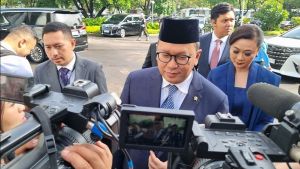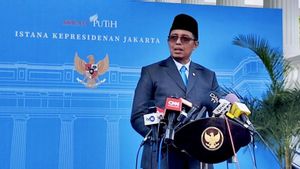JAKARTA - Embrianya, pembentukan Pusat Investasi Pemerintah Investasi Pemerintah Pemerintah (PIP) berdasarkan pada Peraturan Menteri Keuangan (PMK) Nomor 52/PMK.01/2007. PIP dibentuk sebagai upaya awal pemerintah dalam mengelola investasi negara sebelum akhirnya dikosolidasikan dan ditransformasikan menjadi INA.
The Indonesia Investment Authority (INA) is a state-owned investment management institution established in 2021. Its goal is to support sustainable development and build prosperity for future generations in Indonesia. The founder of Indonesian Audit Watch (IAW), Iskandar Sitorus, said that NA is said to be operating as a sovereign wealth fund (SWF) Indonesia which aims to optimize the value of state assets and support sustainable economic development.
"INA was formed based on Law (UU) number 11 of 2020 concerning Job Creation; Government Regulation (PP) number 74 of 2020 concerning Investment Management Institutions; Law number 6 of 2023 which stipulates PP in Lieu of Law number 2 of 2022 concerning Job Creation into Law and Government Regulation number 74 of 2020 which regulates the formation, structure, capital, and governance of INA," Iskandar Sitorus told VOI through a written message, Tuesday, February 25.
Iskandar Sitorus said in the regulation, INA is referred to as an Investment Management Institution (LPI) similar to the Investment Management Agency which has the status of an Indonesian Legal Entity which is fully owned by the Government of Indonesia and is directly responsible to the President.
SEE ALSO:
"Indonesia's initial capital is said to have come from State Capital Participation (PMN) of IDR 75 trillion, consisting of IDR 30 trillion in cash funds from the 2020 and 2021 State Budget and IDR 45 trillion in government share transfers. In addition, INA also received investment from international partners, such as from America, the International Development Finance Corporation and Japan Bank for International Cooperation," he said.
INA Investment Portfolio And Alleged Problems
INA has invested in various strategic sectors, including:
Infrastructure: Investment $1.4 billion for Trans-Sumatra and Trans-Java toll roads. Telecommunications: Investment of 800 million at PT Dayamitra Telekomunikasi (Mitratel). Renewable energy: Investment of $500 million in Pertamina Geothermal Energy (PGE).Health: Investment of $150 million in PT Kimia Farma Tbk. (KAEF). Tourism & Technology: Funding of $300 million for Traveloka.Logistics: Cooperation with ESR Group and Mitsubishi Corporation for the development of logistics parks.
However, a number of INA projects are linked to allegations of corruption and investigations by law enforcement officials, such as:
The Trans-Sumatra Toll Road: Being investigated by the Corruption Eradication Commission (KPK) regarding land acquisition with a potential state loss of up to Rp150 billion. Mitratel and TBIG transactions: Ever studied by the KPK and the Attorney General's Office, with a potential state loss of Rp26 trillion. Transfer of PGE Assets: Reported in February 2023 as an indication of alleged corruption.
The Absence Of BPK Audit And Regulatory Challenges
According to Iskandar Sitorus, although INA manages state funds, until now BPK has never audited or the Financial and Development Supervisory Agency (BPKP). This is due to regulations in PP Number 74 of 2020, which states that INA's financial statements were audited by the public accounting firm (KAP) chosen by the Board of Directors based on the approval of the Supervisory Board.
From the perspective of the State Finance Law Number 17 of 2003, INA is included in the entity that manages state funds. However, if it is not considered as part of state finances, then the supervision can be debated. BPK Law Number 15 of 2006 gives the authority to BPK to audit all institutions that manage state finances, including state assets separated in BUMN and BUMD.
Important articles related to BPK's authority:
Article 6 Paragraph (1): BPK is tasked with examining the management and responsibility of state finances. Article 10 Paragraph (1): BPK has the right to request information from parties managing state funds. Article 11: BPK conducts financial checks, performance, and certain objectives for state financial management entities.
In addition, Article 23E Paragraph (1) of the 1945 Constitution confirms that the BPK has the highest authority in auditing state finances, including separated state assets.
The English, Chinese, Japanese, Arabic, and French versions are automatically generated by the AI. So there may still be inaccuracies in translating, please always see Indonesian as our main language. (system supported by DigitalSiber.id)














